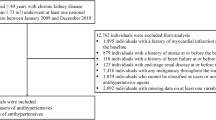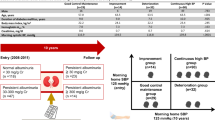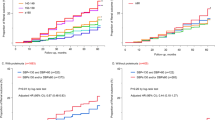Abstract
It is not known whether serum potassium levels affect blood pressure response to antihypertensive medication. The African American Study of Kidney Disease and Hypertension (AASK) Genomics Study (N=828) is a subset of the AASK trial that randomized 1094 African American men and women with hypertensive nephrosclerosis to ramipril, amlodipine or metoprolol. Participants were also randomized to a usual (102–107 mm Hg) or low (⩽92 mm Hg) mean arterial pressure (MAP) treatment goal. Time-to-event analyses were used to determine the relationship between serum potassium at randomization and time (days) to reach an MAP of 107 mm Hg. Mean baseline serum potassium was 4.22 mmol l−1 (s.d.±0.56 and range 2.8–6.0) and the median days to reach target MAP was 32 (interquartile range 8–95). The adjusted hazard ratio (HR) for each 1 mmol l−1 increase in serum potassium was 1.31 (95% confidence interval (CI): 1.08–1.59) in the usual MAP group, and 1.21 (95% CI: 1.02–1.44) in the low MAP group. Secondary findings suggested that women in the usual MAP group on amlodipine were more likely to reach target MAP compared with women randomized to ramipril (HR: 2.05, 95% CI: 1.30–3.21). Older subjects in the low MAP group (⩾55 years) were also more likely to reach target MAP on amlodipine compared with ramipril (HR: 1.57, 95% CI: 1.03–2.38). Serum potassium appears to be a significant predictor of time to blood pressure response, independent of drug class. The effect of serum potassium on blood pressure response to antihypertensive medications needs to be further studied in different patient populations.
This is a preview of subscription content, access via your institution
Access options
Subscribe to this journal
Receive 12 digital issues and online access to articles
$119.00 per year
only $9.92 per issue
Buy this article
- Purchase on Springer Link
- Instant access to full article PDF
Prices may be subject to local taxes which are calculated during checkout
Similar content being viewed by others
References
Cutler JA, Sorlie PD, Wolz M, Thom T, Fields LE, Roccella EJ . Trends in hypertension prevalence, awareness, treatment, and control rates in United States adults between 1988-1994 and 1999-2004. Hypertension 2008; 52: 818–827.
Hall WD, Ferrario CM, Moore MA, Hall JE, Flack JM, Cooper W et al. Hypertension-related morbidity and mortality in the southeastern United States. Am J Med Sci 1997; 313: 195–209.
Hertz RP, Unger AN, Cornell JA, Saunders E . Racial disparities in hypertension prevalence, awareness, and management. Arch Intern Med 2005; 165: 2098–2104.
Wright JT, Bakris G, Greene T, Agodoa LY, Appel LJ, Charleston J et al. Effect of blood pressure lowering and antihypertensive drug class on progression of hypertensive kidney disease: results from the AASK trial. Jama 2002; 288: 2421–2431.
Gu Q, Burt VL, Paulose-Ram R, Yoon S, Gillum RF . High blood pressure and cardiovascular disease mortality risk among U.S. adults: the third National Health and Nutrition Examination Survey mortality follow-up study. Ann Epidemiol 2008; 18: 302–309.
Watson RL, Langford HG . Weight, urinary electrolytes and blood pressure—results of several community based studies. J Chronic Dis 1982; 35: 909–918.
Khaw KT, Barrett-Connor E . The association between blood pressure, age, and dietary sodium and potassium: a population study. Circulation 1988; 77: 53–61.
Patki PS, Singh J, Gokhale SV, Bulakh PM, Shrotri DS, Patwardhan B . Efficacy of potassium and magnesium in essential hypertension: a double-blind, placebo controlled, crossover study. Bmj 1990; 301: 521–523.
Siani A, Strazzullo P, Russo L, Guglielmi S, Iacoviello L, Ferrara LA et al. Controlled trial of long term oral potassium supplements in patients with mild hypertension. Br Med J (Clin Res Ed) 1987; 294: 1453–1456.
Svetkey LP, Yarger WE, Feussner JR, DeLong E, Klotman PE . Double-blind, placebo-controlled trial of potassium chloride in the treatment of mild hypertension. Hypertension 1987; 9: 444–450.
D'Elia L, Barba G, Cappuccio FP, Strazzullo P . Potassium intake, stroke, and cardiovascular disease a meta-analysis of prospective studies. J Am Coll Cardiol 2011; 57: 1210–1219.
Yang Q, Liu T, Kuklina EV, Flanders WD, Hong Y, Gillespie C et al. Sodium and potassium intake and mortality among US adults: prospective data from the Third National Health and Nutrition Examination Survey. Arch Intern Med 2011; 171: 1183–1191.
Wright JT, Agodoa L, Contreras G, Greene T, Douglas JG, Lash J et al. Successful blood pressure control in the African American Study of Kidney Disease and Hypertension. Arch Intern Med 2002; 162: 1636–1643.
Wright JT, Kusek JW, Toto RD, Lee JY, Agodoa LY, Kirk KA et al. Design and baseline characteristics of participants in the African American Study of Kidney Disease and Hypertension (AASK) Pilot Study. Control Clin Trials 1996; 17: 3S–16S.
Lee J, Aziz H, Liu L, Lipkowitz M, O'Connor DT, Richard E et al. Beta(1)-adrenergic receptor polymorphisms and response to beta-blockade in the African-American study of kidney disease and hypertension (AASK). Am J Hypertens 2011; 24: 694–700.
Hosmer DW, Lemeshow S, May S . Applied Survival Analysis: Regression Modeling of Time-to-Event Data. 2nd edn. Wiley-Interscience: Hoboken, NJ, 2008.
Sudhir K, Forman A, Yi SL, Sorof J, Schmidlin O, Sebastian A et al. Reduced dietary potassium reversibly enhances vasopressor response to stress in African Americans. Hypertension 1997; 29: 1083–1090.
Bianchetti MG, Weidmann P, Beretta-Piccoli C, Ferrier C . Potassium and norepinephrine- or angiotensin-mediated pressor control in pre-hypertension. Kidney Int 1987; 31: 956–963.
Lawton WJ, Fitz AE, Anderson EA, Sinkey CA, Coleman RA . Effect of dietary potassium on blood pressure, renal function, muscle sympathetic nerve activity, and forearm vascular resistance and flow in normotensive and borderline hypertensive humans. Circulation 1990; 81: 173–184.
Korgaonkar S, Tilea A, Gillespie BW, Kiser M, Eisele G, Finkelstein F et al. Serum potassium and outcomes in CKD: insights from the RRI-CKD cohort study. Clin J Am Soc Nephrol 2010; 5: 762–769.
Hayes J, Kalantar-Zadeh K, Lu JL, Turban S, Anderson JE, Kovesdy CP . Association of hypo- and hyperkalemia with disease progression and mortality in males with chronic kidney disease: the role of race. Nephron Clin Pract 2012; 120: c8–16.
Veterans Administration Cooperative Study Group on Antihypertensive Agents. Urinary and serum electrolytes in untreated black and white hypertensives. J Chronic Dis 1987; 40: 839–847.
Gibbs CR, Beevers DG, Lip GY . The management of hypertensive disease in black patients. QJM 1999; 92: 187–192.
Benowitz NL . Antihypertensive agents. In: Katzung BG, Masters SB, Trevor AJ (eds). Basic & Clinical Pharmacology. Mc Graw Hill: New York, NY, 2007.
Cummins CL, Wu CY, Benet LZ . Sex-related differences in the clearance of cytochrome P450 3A4 substrates may be caused by P-glycoprotein. Clin Pharmacol Ther 2002; 72: 474–489.
Bhatnagar V, O’Connor DT, Schork NJ, Salem RM, Nievergelt CM, Rana BK et al. Angiotensin-converting enzyme gene polymorphism predicts the time-course of blood pressure response to angiotensin converting enzyme inhibition in the AASK trial. J Hypertens 2007; 25: 2082–2092.
Acknowledgements
The funding sources for this study are: National Institutes of Health (K23 RR020822), Department of Veterans Affairs.
Author information
Authors and Affiliations
Corresponding author
Ethics declarations
Competing interests
The authors declare no conflict of interest.
Rights and permissions
About this article
Cite this article
Bhalla, M., Aziz, H., Richard, E. et al. Serum potassium predicts time to blood pressure response among African Americans with hypertensive nephrosclerosis. J Hum Hypertens 27, 393–396 (2013). https://doi.org/10.1038/jhh.2012.47
Received:
Revised:
Accepted:
Published:
Issue Date:
DOI: https://doi.org/10.1038/jhh.2012.47



